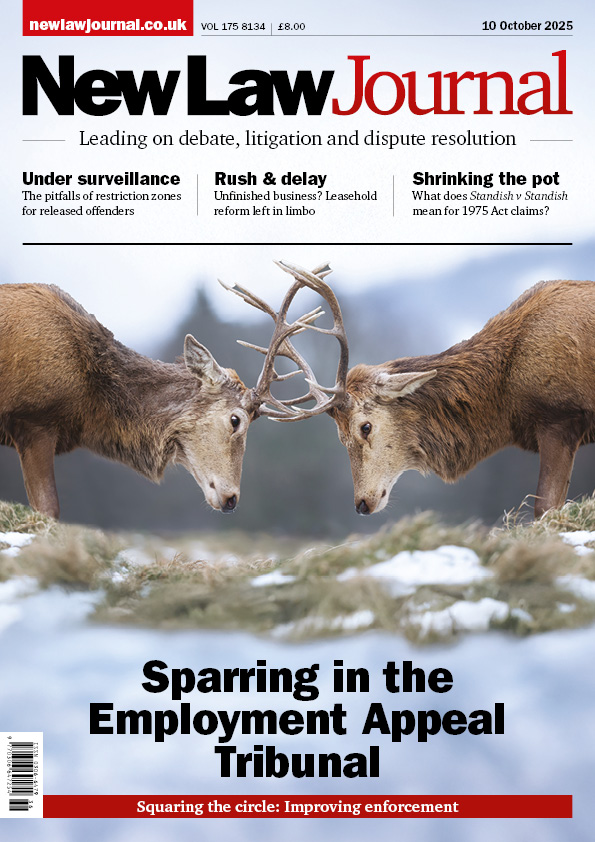THIS ISSUE

Writing in NLJ this week, Katherine Harding and Charlotte Finley of Penningtons Manches Cooper examine Standish v Standish [2025] UKSC 26, the Supreme Court ruling that narrowed what counts as matrimonial property, and its potential impact upon claims under the Inheritance (Provision for Family and Dependants) Act 1975
In this week's NLJ, Dr Jon Robins, editor of The Justice Gap and lecturer at Brighton University, reports on a campaign to posthumously exonerate Christine Keeler. 60 years after her perjury conviction, Keeler’s son Seymour Platt has petitioned the king to exercise the royal prerogative of mercy, arguing she was a victim of violence and moral hypocrisy, not deceit. Supported by Felicity Gerry KC, the dossier brands the conviction 'the ultimate in slut-shaming'
Without enforcement, judgments are worthless. HHJ Karen Walden-Smith sets out the Civil Justice Council’s recommendations to improve effectiveness & efficiency
Antonia Mee on why all professionals involved in family law should be trained to recognise trauma
Marie Law, Director of Toxicology at AlphaBiolabs, discusses the application and benefits of repeat drug and alcohol testing in the Family Court
In this week's employment law brief for NLJ, Ian Smith, barrister and emeritus professor at UEA, surveys a run of Employment Appeal Tribunal (EAT) rulings underscoring the procedural rigour of tribunal practice
The Solicitors Regulation Authority (SRA) has published a statement in a bid to clear up confusion over the right to conduct litigation following Mazur and another v Charles Russell Speechleys
Homebuyers could be given an option to sign a binding contract with vendors to protect against the practice of parties pulling out of agreements after months of negotiations, under a proposed overhaul of conveyancing laws
A future Conservative government would abolish the Sentencing Council and Judicial Appointments Commission (JAC) and sack judges who defended migrants’ rights, shadow justice secretary Robert Jenrick has said
The right of the press to report on the criminal courts received a boost this week, following an update to the Criminal Procedure Rules
MOVERS & SHAKERS

Freeths—Ruth Clare
National real estate team bolstered by partner hire in Manchester

Farrer & Co—Claire Gordon
Partner appointed head of family team

mfg Solicitors—Neil Harrison
Firm strengthens agriculture and rural affairs team with partner return
NEWS
Conveyancing lawyers have enjoyed a rapid win after campaigning against UK Finance’s decision to charge for access to the Mortgage Lenders’ Handbook
The Crown Prosecution Service (CPS) has launched a recruitment drive for talented early career and more senior barristers and solicitors
Regulators differed in the clarity and consistency of their post-Mazur advice and guidance, according to an interim report by the Legal Services Board (LSB)
The Solicitors Act 1974 may still underpin legal regulation, but its age is increasingly showing. Writing in NLJ this week, Victoria Morrison-Hughes of the Association of Costs Lawyers argues that the Act is ‘out of step with modern consumer law’ and actively deters fairness
A Competition Appeal Tribunal (CAT) ruling has reopened debate on the availability of ‘user damages’ in competition claims. Writing in NLJ this week, Edward Nyman of Hausfeld explains how the CAT allowed Dr Liza Lovdahl Gormsen’s alternative damages case against Meta to proceed, rejecting arguments that such damages are barred in competition law









